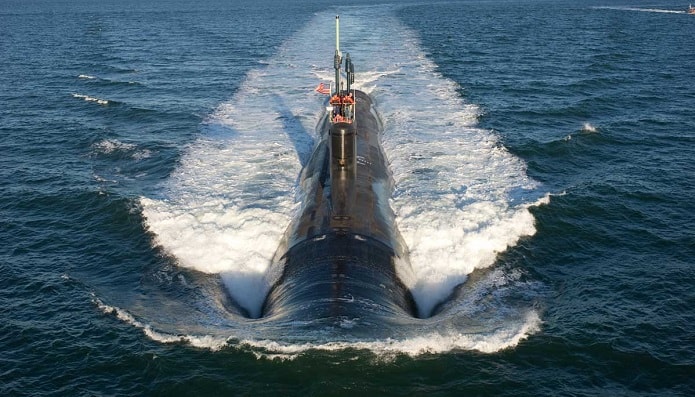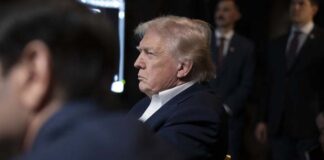The Coalition’s new military agreement with the US and Britain, known as AUKUS, brings war with China a big step closer.
The deal will see Australia become just the second ally after Britain to get access to US nuclear-powered submarine technology. Only six nations currently have nuclear-powered subs, all of which have nuclear power stations and nuclear weapons.
Australia will build a fleet of at least eight US-designed submarines in Adelaide to replace the Collins class currently in use—dumping the deal with France to construct its diesel-fuelled subs.
AUKUS covers much more, including the use of artificial intelligence, quantum technologies and cyber.
Prime Minister Scott Morrison declared: “The relatively benign environment we have enjoyed in many decades in our region is behind us. We have entered, no doubt, a new era.”
While he didn’t name a common enemy, everyone knew who he meant.
US President Joe Biden had justified retreating from the 20-year imperialist war in Afghanistan to focus on the threat to US domination of the western Pacific by China.
Now, just weeks after their forces scuttled out of Kabul, Morrison, Biden and British Prime Minister Boris Johnson were sharing a stage to prepare for the next conflict.
Shamefully, ALP leader Anthony Albanese didn’t hesitate to pledge Labor’s support for the AUKUS partnership.
Platforms
Morrison billed the new pact as creating safety for Australians. But nuclear-powered submarines are designed to make fighting a war much more attractive.
They can carry more weapons, stay on patrol under water for much longer, and are much harder to detect than conventional subs—making them ideal platforms for launching sudden missile strikes.
As The Economist reports: “The Centre for Strategic and Budgetary Assessments, an American think-tank, calculates that whereas a diesel-electric submarine sailing from Perth could remain ‘on station’ for 11 days in the South China Sea, a nuclear sub could do so for more than two months.
“The proposed new vessels would thus provide ‘real … striking power’, says Malcolm Davis of the Australian Strategic Policy Institute, ‘which is what we need in deterring and responding to a growing challenge from China’s PLA [People’s Liberation Army]’.”
Nuclear propulsion also brings with it a host of new problems within Australia, involving the handling of radioactive materials and their ultimate disposal.
As Greens leader Adam Bandt rightly says, this “puts floating Chernobyls in the heart of Australian cities”.
While Morrison says there will be no nuclear weapons, fuel from the submarines’ reactors could potentially be repurposed.
The nuclear non-proliferation treaty allows non-nuclear-armed signatories like Australia to remove nuclear material from formal international oversight if it is for a submarine.
The Economist writes: “The enriched uranium in submarines, however, is the same as that used in a bomb. Worse still, the fuel used in both British and American submarines is enriched to especially high levels.”
All of this will come at an eye-watering cost. The abandoned French subs were set to cost $90 billion, plus even more in upkeep, and nuclear-powered versions are likely to be much more expensive.
Morrison paints this as a win for jobs—but using that money for a rapid shift to publicly owned, 100 per cent renewable energy would create at least 130,000 green jobs over 10 years, mobilising many of the skills that shipyard workers already have.
Bases
The AUKUS announcement comes just before the first leaders’ summit of the Quad, the alliance between the US, Australia, Japan and India, on 24 September.
It signals Biden’s growing determination to surround and intimidate the Chinese leadership.
AUKUS integrates Australia even more tightly into the US war-fighting system.
Australia already hosts two installations vital to the US military—North-West Cape near Exmouth in WA and Pine Gap near Alice Springs in the Northern Territory. The first transmits radio signals to ships and submarines in the Pacific, while Pine Gap is part of the global control system for US missiles and drones.
Under an agreement made by former Labor Prime Minister Julia Gillard, up to 2500 US marines are based in Darwin. Defence Minister Peter Dutton said in June that he wanted to increase that number.
Australia’s rulers are working with the US not because they are lackeys but to shore up Australia’s own influence and sway in the local region. The Guardian reported today: “British sources said the conversations about the nuclear power deal were initiated by the Australians in March.”
And The Australian recently reported that Dutton has been putting pressure on Biden to increase visits by US navy ships and to launch a joint project for Australia to produce guided missiles.
Morrison and Dutton have been beating the drums of war with China for many months and AUKUS represents a significant step change for their plans.
Workers in Australia and China have nothing to gain from conflict. Even a small clash could escalate quickly, including the use of nuclear weapons. There would be no winners.
The Electrical Trades Union immediately condemned the plan for nuclear-powered submarines.
Unions, anti-nuclear campaigners and socialists need to launch a campaign to leave AUKUS dead in the water.
By David Glanz






